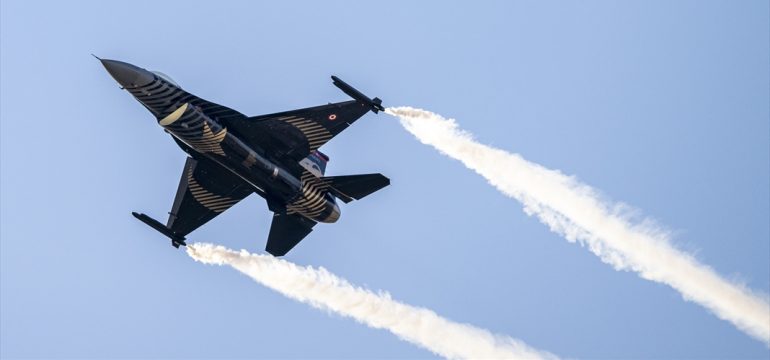Turkish fighter jets conducted airstrikes in Iraqi Kurdistan late Sunday, following an explosion earlier that day which injured two police officers near the Turkish parliament in Ankara.
“Turkish army planes bombed parts… of the Bradost region at around 9:20 pm (1820 GMT), as well as the village of Badran,” Ihsan Chelabi, mayor of the town of Sidakan, close to the Turkish and Iranian borders, told AFP.
Turkey’s defence ministry acknowledged an “air operation” in northern Iraq to “neutralise the PKK”, which is considered a terror group by Ankara and its Western allies.
“An air operation was carried out in the regions of Metina, Hakurk, Qandil and Gara, in northern Iraq, on October 1 at 2100,” the statement said.
It said the operation was “to neutralise the PKK and other terrorist elements, prevent terrorist attacks from northern Iraq against our population and our law enforcement agencies, and ensure the security of our borders”.
Shortly after the bombing, Turkish President Recep Tayyip Erdogan vowed, “terrorists” would never achieve their aims.
The Kurdistan Workers’ Party (PKK), designated as a terror organization by Turkey and many Western countries, claimed responsibility for the explosion. The group has been fighting against the Turkish government for 40 years.
The area impacted by the blast houses several government ministries and the Turkish parliament. The parliament resumed its scheduled session in the afternoon, during which Erdogan stated, “The villains who threaten the peace and security of citizens have not achieved their objectives and will never achieve them.”
The interior ministry stated two attackers arrived in a commercial vehicle around 9:30 am local time in front of “the entrance gate of the General Directorate of Security of our Ministry of the Interior, and carried out a bomb attack.”
“One of the terrorists blew himself up,” said Interior Minister Ali Yerlikaya to journalists. “The other was killed by a bullet to the head before he had a chance to blow himself up.”
Two police officers sustained minor injuries during the altercation, but they are not in critical condition, he added.
The Ankara prosecutor’s office announced an investigation has been launched and restricted access to the affected area. They also requested local media refrain from broadcasting images from the site.
In a statement to the ANF news agency, which is close to the Kurdish movement, the PKK said, “a sacrificial action was carried out against the Turkish Interior Ministry.”
In his opening remarks, Erdogan criticized the European Union for delaying Turkey’s membership application, stating, “Turkey no longer expects anything from the European Union, which has kept us waiting at its door for 40 years.”
“We have kept all the promises we have made to the EU but they have kept almost none of theirs,” he said, adding that he would not “tolerate any new demands or conditions” for Turkey’s admission into the union.
This session of Turkey’s parliament is set to validate Sweden’s admission into the NATO alliance.
In July, Hungary and Turkey lifted their vetoes against Sweden’s inclusion in the Atlantic alliance but have delayed final ratification.
Erdogan said in July that the Turkish parliament wouldn’t ratify the decision before October, though approval is anticipated this legislative year.
Erdogan has been urging Sweden for months to address Quran desecrations, an issue that has heightened tensions between the two nations.
Sweden’s Prime Minister Ulf Kristersson swiftly affirmed in a statement that Sweden “once again confirms its commitment to long-term cooperation with Turkey in the fight against terrorism.”
Many foreign leaders expressed support for Turkey following the attack, including officials from Germany, the United Kingdom, and the U.S. embassy in Ankara.
The Kurdistan Regional Government condemned the attack, stating: “The KRG reaffirms its steadfast commitment to combating all forms of terrorism and extremism, urging the international community to enhance collaboration and coordination in the fight against terrorism, its ideologies, and related activities.”
The KRG is led by the Kurdistan Democratic Party, which has close political and economic ties with Turkey and is at odds with the PKK. The latter has occupied many Kurdistan Region mountain ranges. Turkey has used this as pretext for ground incursions and sustained airstrikes against the PKK, often resulting in civilian deaths.
Over the past 25 years, Turkey has set up dozens of military bases in Iraqi Kurdistan to combat the group.
Ankara, the Turkish capital, experienced several attacks, especially in 2015 and 2016. Many of these were attributed to the PKK or the Islamic State group.
Since 1984, the PKK has led an insurgency against the Turkish government, resulting in tens of thousands of casualties.
In October 2015, an attack near a central station in Ankara, attributed to the Islamic State group, left 109 dead.
The latest bombing in Turkey occurred on a shopping street in Istanbul in November 2022, killing six and injuring 81.
AFP


